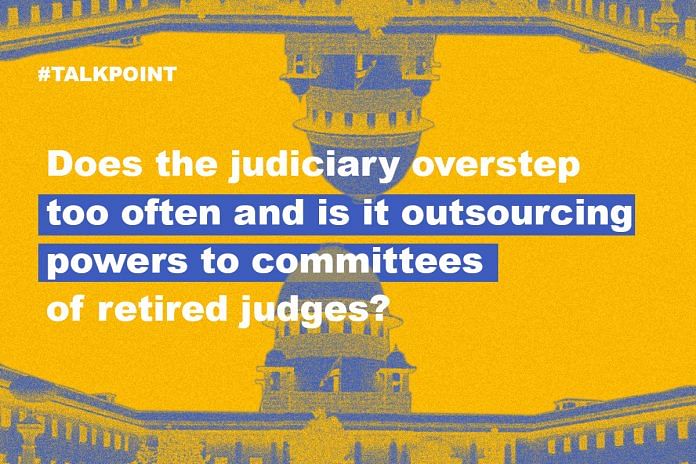Three significant comments made this weekend reignited the debate about separation between the judiciary and the executive.
President Ram Nath Kovind cautioned that the judiciary, the executive, and the legislature “need to be careful not to cross into each other’s finely-defined spaces. Or give the opportunity to read transgressions even when none is intended“.
Prime Minister Narendra Modi said “the balance between the legislature, judiciary, and executive has been the backbone of our Constitution. Because of this balance, our nation was able to defeat Emergency… we have to fulfil the people’s hopes and aspirations while remaining within our limits”.
Chief Justice Dipak Misra said “there is a perception that there is judicial activism”, adding that “there is no desire to enter policy making”.
ThePrint asks experts: Is the judiciary stepping into executive domain too often and outsourcing its powers to committees of retired judges?
Prime Minister Modi is right in asserting that all constitutional institutions should operate within their defined limits. But then strict ‘separation of powers’ is not possible even in the USA, which has the presidential form of government. In the parliamentary form of government, where the executive is responsible to the legislature, this is impossible. Accordingly, the Indian Constitution does not have ‘separation of powers’ but ‘separation of functions’.
But then, an independent judiciary is necessary in any federal polity, and judges need to uphold a citizen’s fundamental rights. Since the state is the greatest repository of power, the biggest threat to civil liberties comes from the state. Courts try to keep them within constitutional limits, so governments try to appoint committed judges. No government likes independent judges.
Here are other sharp perspectives on judicial overreach:
Alok Prasanna Kumar, Senior Resident Fellow at Vidhi Centre for Legal Policy
Sanjay Hegde, senior advocate at the Supreme Court
Shekhar Gupta, Editor-in-Chief, ThePrint
Even a statesman of Jawaharlal Nehru’s stature explicitly elaborated the government’s view on the subject on 10 September 1949 in the Constituent Assembly: “Within limits no judge and no Supreme Court can make itself a third chamber. No Supreme Court and no judiciary can stand in judgment over the sovereign will of Parliament. If we go wrong here and there, it can point it out, but in the ultimate analysis where, the future of the community is concerned, no judiciary can come in the way. And if it comes in the way, ultimately, the whole Constitution is a creature of Parliament.”
He went on to observe on the possibility of picking pro-government judges: “If courts prove obstructive, one method of overcoming the hurdle is… the executive, which is the appointing authority of judges. [It can] begin to appoint judges of its own liking for getting decisions in its own favour.”
But then, under the ‘political ticket’ doctrine, judges are not supposed to interfere in the policy making, which should be the exclusive domain of the executive. In striking down reservation of OBC groups like Jats, Gujjars, Muslims etc., the judiciary went beyond its brief. It is not supposed to undertake ‘strict scrutiny’ of legislative acts. ‘Judicial review’ is good but ‘judicial activism’ is not.
Faizan Mustafa is the Vice-Chancellor NALSAR University of Law, Hyderabad.




The quote from Nehru is misplaced. Nehru was trying to say that in the event of judicial activism, there is an automatic check that will come into play – viz, the executive will become more assertive. Which is merely saying that there is a check and balance available for unreasonable judicial activism. Besides, it is indeed true that the Constitution initially did provide for Parliamentary supremacy. Kesavanand Bharati, among others, changed that with the “basic structure” doctrine. The rush to blame Nehru or find fault with him is uncalled for here.